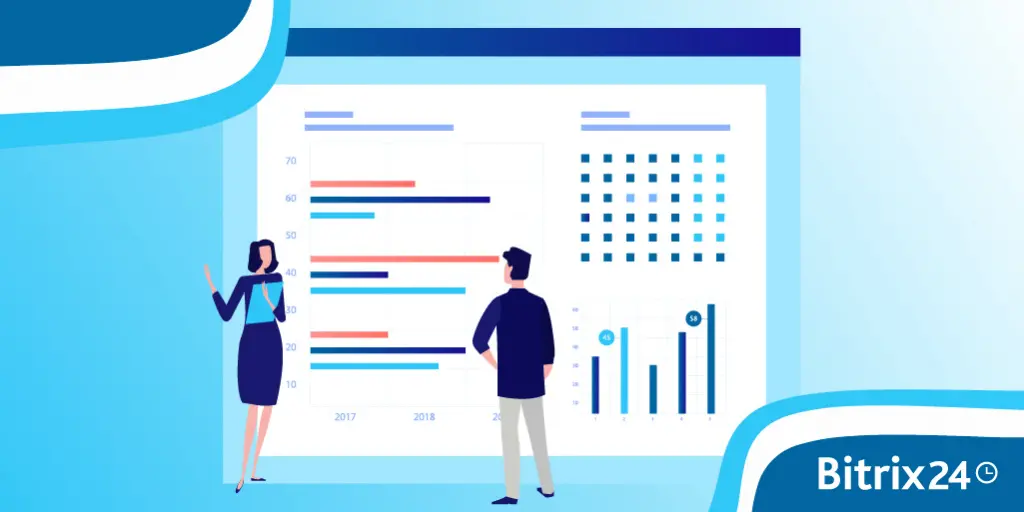Why Is a CRM Essential for a Construction Organization?
The primary mission of a CRM consists of optimizing the relationships between an organization and its clients. Such software also maximizes the efficiency of the company's internal operations.
It is essential for streamlining tasks and enhancing collaboration among different departments of the enterprise. Plus, it enables them to obtain informative insights that can further optimize their workflow.
A modern client or contractor CRM goes far beyond a database with the names and email addresses of people you interact with. It features multiple instruments that help businesses to improve the relationships with their audience and boost their sales.
In such a system, you can store information not only about your customers but also about partners, shareholders and any third parties involved. Specialists can track all their relationships to make sure that they remain efficient and they do not forget about certain links of the chain.
Normally, one can access client and contractor CRM software both from stationary computers and portable gadgets. Each team member gets to know about urgent updates without delays and reacts promptly (to save you considerable funds!).
Lately, the margins in the construction sector have been shrinking. Moreover, the forecasts about margins tend to be less precise with each year.
Companies are earning significantly less nowadays than they expected. Since there are no unified industry reference points, professionals often fail to estimate the project accurately, unless they rely on software.
Without a CRM, it becomes too tricky to forecast sales and set realistic objectives. An attempt to set financial objectives turns into a challenge.
Yet if you rely on guesswork and not solid data when planning your expenses and income, you risk facing serious cash problems, up to losing your business.
When optimizing their workflow, business owners should think not only about their performance but also about their reputation. The construction industry is a rather close-knit community. Professionals quickly get to know about each other's achievements and failures. When selecting a new partner or contractor, they largely rely on common knowledge. The fact that you use a forward-thinking CRM might become a crucial argument in favor of signing a contract with you.
In general, this piece of software can bring you multiple competitive edges — provided that you opt for a powerful CRM and teach all your staffers to handle it properly. Below, you will find step-by-step instructions on how to select a truly top-notch product.
What Advantages does CRM Bring?

With a high-quality CRM, you can achieve the following goals:
● Develop mutually fruitful relationships
● Automate homogenous tasks
● Monitor your staff's performance
● Enhance collaboration
● Enhance intelligence
● Boost sales
Traditionally, handling contacts has never been the forte of construction organizations. Many of today's successful businesses used to rely on paper files when they just got started. Later on, they switched to spreadsheets and emails. Without a CRM, it takes them too much time to find the necessary contacts and update the information that is not relevant anymore.
Such a type of software will become the unified data storage for all the departments. This should enable you to overcome an urgent industry challenge that veteran workers are reaching retirement age, while the projects are becoming more and more complicated. Younger specialists who lack skills and expertise fail to cope with daunting tasks as efficiently as their older colleagues. This might provoke disorder and turmoil, your risks will increase.
Thanks to a CRM, your staff members can share precious insights, forecast the results of their activities and stay organized.
The most tedious repetitive tasks are data entry, scheduling appointments and following up contacts. When your staff members stop wasting their time on these duties, they will be able to concentrate on high-priority tasks.
For instance, you want to share project details with each of your contractors. Without a CRM, managers would need to send a separate email to each of them.
Yet with this piece of software, you can predefine personalized details for each contact and send them an identical message. The time that your staff saves can be used for generating new leads, managing active projects and other meaningful activities.
The biggest performance-related challenge consists in the fact that organizations need to juggle too many clients, contractors and projects simultaneously. A CRM tracks all this information at multiple levels, be it a detailed project view or a general overview.
Supervisors can monitor the progress of all tasks, reassign them to other specialists, ask several professionals to join forces and so forth. Managers clearly see which tasks they need to finalize to accelerate the project implementation.
In a CRM, all your information is stored in one place, which facilitates forecasting the results and measuring them once they are achieved.
Without a CRM, it is hard to orchestrate productive teamwork. Your team might fail to complete some tasks, while others might be assigned to the wrong specialists by accident. With appropriate software, you can align goals more efficiently and standardize processes. Many CRMs enable managers to share their projects with their partners — this can accelerate your workflow and help you to better reach your objectives.
It is true that the initial integration of the system might take quite a lot of time. But once you accomplish it, you can forget about tedious manual work.
Your productivity will increase and your staff will have more time for vital tasks. Your employees will be less subject to stress and will report greater job satisfaction.
CRMs without integration capabilities cost less but their benefit is usually less pronounced. Efficient communication between departments and workflows is essential for building cross-functional teams.
Construction deals are highly dynamic. Their deadlines, costs and the parties involved can change rapidly. Managers should be abreast of events and have an opportunity to access any information in just a few seconds (being sure that it is relevant and not outdated). Spreadsheets are not fit for this purpose because they lack tools for automated information updates. Emails are even worse since you cannot group or systematize the data.
A CRM not only provides you with convenient access to information but also helps you to structure and prioritize it. For instance, you receive a lead that you need to carry out immediately.
It is not a big task and a team of two or three people can handle it. But imagine that all your team is currently busy with a larger lead that has started a while ago… Thanks to a CRM, you can prioritize the newer lead over the older one and efficiently balance both. This piece of software is crucial for making smarter decisions and managing the pipeline.
All the above-listed advantages eventually lead to greater client satisfaction. After you automate your processes and entrust them to a reliable system, you will eliminate the unwanted human factor. You will definitely still need the human touch for personalized communication with your clients. But your workflow will immediately benefit from the automatization of other tasks and duties.
CRM for the Construction Industry
Using this type of software here is a bit different from employing it in many other business spheres. Construction companies collaborate with multiple contractors, each of them with its particular sphere of responsibility. Managers should develop a special pattern for dealing with each type of contractor and never apply it to any other type of organization.
Normally, contractors get to know the first news about an upcoming object while it is still at the planning stage. Then, the rumors become reality: the general contractor receives an offer from the owner or developer of the project. The general contractor familiarizes itself with the information and sends out invitations to bid to its network of subcontractors. After that, the general contractor reaches out to the developer. Finally, the team of the projects starts to promote and sell it. All the stages of this lengthy process, except for the first one that is based on rumors, can considerably benefit from a CRM.
The offer in the construction industry is always limited. Dozens of customers might be interested in the same object — yet the company cannot increase the size of this object or create multiple copies of it to cater to the demand. The CRM enables managers to build efficient relationships with potential buyers and track their statuses.
Besides, people do not buy real estate too often. It does not make sense to contact them each month, offering new properties. In a CRM, managers can build an efficient communication strategy for years ahead. It will increase their chances to convert those people who were interested in certain objects but failed to buy them earlier, into customers.
How to Compile a Strategy for Your CRM

This piece of software is a powerful and versatile instrument. Yet it is not enough to install it and wait until the magic happens. You need to build a strategy for using the CRM, which starts with identifying the following aspects of your workflow:
● Relationships
● Client journey
● Metrics
The larger your organization, the more multifaceted its relationships with people, government and business entities. International enterprises that build commercial projects are normally involved in more relationships if compared to those that deal with small business and local housing projects.
Usually, there would be different pipelines in the system for contractors and staff. Each team member can handle their contracts and relationships independently. Professionals have a right to either include certain types of relationships in the CRM or skip this opportunity altogether. Entrepreneurs might manage their communications with the local authorities by email for the sake of privacy. The CRM allows you to adjust your privacy settings, however, governmental officials might want to avoid cloud services. Email might be their preferred channel of communication, and since your governmental contacts are probably not too numerous, you can handle them outside your CRM as an exception.
The term "relationships journey" refers to the procedure of finding new clients or contractors and building relationships with them. There might be obstacles and bottlenecks in this procedure so you should know how to overcome them. When mapping out the journey, you should set up tangible goals for each phase. But please avoid the common mistake of overloading the system with excessive details. The CRM should not contain every single byte of information that is related to your relationship journey. You should store only meaningful details and updates there.
Managers might use dozens of metrics to assess the company's performance — but not all of them are relevant to your business. Your staff should focus only on those KPIs that reflect your efficiency in achieving your goals. Forget about vanity and the attempts to outperform yourself. Concentrate on those indicators that help you analyze the activities that you have already completed and the targets that you set for yourself.
These are valuable indicators based on completed activities:
● How many phone calls were made
● How many messages were sent
● What is your sales rate of leads follow-ups
● How long does it take your leads to respond
And here are those that are focused on your targets:
● How many deals are there in the pipeline
● What is the win rate
● How large is the average deal
● How long does it take the manager to close the average deal
● Which revenue do you get in total
These were just approximate examples. You should compile a tailor-made list of indicators for your business and narrow it down to no more than a dozen of the most vital ones. Only for huge enterprises, it makes sense to take over a dozen of indicators into account.
The Main Functionality of a Construction CRM

The product should be customized immediately after the installation. Here are the components of the system that are vital for the construction sector:
● Managing the pipeline
● Managing your activities
● Managing your contacts
● Data analytics
● Forecasting
In a good client and contractor CRM, all the phases of your sales cycle will be clearly visible. Managers easily identify the positions of the prospects in the cycle. Such data visualization enables them to single out the projects with the highest potential. Plus, they can timely identify the ones that are about to collapse and take measures to save them.
Since the information is very well structured, you rapidly understand which projects you need to concentrate on and which ones you might want to close. When analyzing sales activities, managers can precisely detect the phases where the deal might fail and prevent the failure while it is not too late, testing diverse techniques.
The system allows you to track the tasks connected not only with sales but also with interactions with third parties. Your contract management will become more efficient and you will always comply with regulations. It will become genuinely simple to keep track of project quotes.
Initially, CRM solutions were invented to help businesses manage their contacts. Their databases are highly comprehensive and offer intuitive navigation. It enables you to store not only the contact details of your clients and partners but also activity records and other meaningful statistics. Some solutions enable their users to pull data from social media and update them in real-time.
Construction organizations need to collect and analyze data because it enables them to make wiser decisions. However, not any information is valuable. The CRM will enable you to sort out and process the data that will provide you with actionable insights. These are just a few examples of questions that can be answered thanks to a CRM: which kind of training should you conduct for your sales team to help them close more deals? Which channels of communication tend to bring the best results when dealing with a target audience with certain characteristics? What trends and shifts in the communication processes affect your sales the most?
Advanced software is indispensable for analyzing vital KPIs for your business. It packs valuable data in a digestible format and gives you multiple instruments to process it. The ultimate goal of data analysis is to identify the challenges that might prevent you from closing deals and find ways to overcome them.
The analysis is crucial for forecasts. Based on the facts and numbers from the past, professionals predict the number of deals that you will be likely to close in a certain period in the future. Managers will estimate the approximate value and duration of each of these deals. They will allocate their resources more reasonably and maximize the success rate.
Thanks to analytics, sales teams learn to be more proactive and independent. They will rely less on the instructions of the supervisor. Instead, they will come up with their own suggestions based on factual evidence. They will act more consciously and responsibly.
Key Criteria of a Top-Notch CRM
When comparing different system, concentrate on the following parameters:
● Functionality
● Price
● Developer
● Setup
● Integrations
● On-premise or cloud-based
CRMs differ greatly by their level of complexity. Some of them might be too complicated for the construction business and have many excessive features. The one your purchase should match the scale of your enterprise, the number of your departments and the peculiarities of your sales process.
You should not limit yourself only to solutions that are targeted specifically at the construction industry. Even though they might have some worthy features, many of them lack integration opportunities and are not too customer-friendly. In practice, many successful construction companies rely on general CRMs, not tailor-made for any particular industry. Flexibility is essential: after you purchase a system, you should customize it.
The price tag of a CRM might vary from a few dollars to a few hundred dollars per user. But this does not mean that the costlier the product, the more benefits you will reap or vice versa. The most budget-friendly solutions might seem good at first sight, but then it might turn out that they charge too much for add-ons or lack certain vital features. In the long term, they might be noticeably pricier than in the first weeks of usage.
Remember that you install a CRM to improve your ROI. Calculate how much time your staff spends on sales and what benefit you can gain if you employ a CRM. Managers seriously need this piece of software if they notice missed opportunities and do not want to lose their chances anymore.
Avoid relying exclusively on hype and advertising. Instead, check the reputation of the vendor. What do customers think about its products? Do they justify their price?
After you install the CRM, the staff might complain that their daily routine has become more difficult. But once they get used to the system, they will admit that it facilitates many processes. The most challenging phase of the initial setup is typically adding the contacts and other data. Top CRMs enable their users to handily import data.
Besides, they easily integrate with other business instruments, be it accounting programs or marketing instruments. Managers can create invoices, automate promotional campaigns and perform many other operations right in the CRM. Thanks to data integration, your performance might increase by up to 30%. But if the integrations are too complicated or not accessible at all, you risk losing important data. Manual updating of the records consumes too much time and is prone to error because of the human factor.
Most modern CRMs are deployed in the cloud format. If compared to their on-site counterparts, these are more budget-friendly. There is no need to purchase hardware, pay for lengthy installation or constant IT support. However, some organizations opt for on-premise alternatives because they give them a larger control over their data. Besides, users of an on-site system do not depend on third-party maintenance.
How to Select an Optimal CRM

To pick a powerful and user-friendly CRM for construction, follow these instructions:
● Compile a list of your demands and preferences. Why should you purchase this piece of software? What goals do you hope to achieve using it and what indicators do you want to improve? Which aspects of your workflow require enhancement? Remember: you do not need to adjust your needs to the CRM. Instead, purchase a CRM that will meet your demands.
● Glance through the ratings of the CRM brands, there is plenty of such information on the Internet. Mind that not all ratings are impartial and some were compiled only to promote certain products. To objectively detect the top-performing products, you should compare several ratings.
● Use a search engine to discover more solutions. Some of them have not entered any ratings yet because they are too new. Or, maybe, they underwent a rebranding or had meaningful upgrades.
● Glance through the reviews of those CRMs that produced the best impression on you. Pay equal attention both to customers' and experts' reviews: regard the former as an auxiliary source of information and the latter as the primary one. Mind that not all reviews are impartial. Some brands might order positive reviews in terms of their promotional campaign. Ordering negative reviews to tarnish the reputation of a rival would be a rare case, but some users might criticize a product simply because they are in a bad mood. So focus not on the emotional assessment but the facts the author backs up their opinion with (What makes the CRM stand out from the rest? Is it prone to bugs? How efficiently does it cope with a significant workload?)
● Those who doubt whether they would cope with that much information themselves should hire a CRM adviser. These professionals will pick a worthy system for you and configure it.
Specialists who have never dealt with CRM systems before might be surprised by how vast the assortment is. They can select among dozens of providers — and each of the top products will have its unique competitive feature. Once you choose an opportune piece of software, you will need to ask its developer to conduct training for your staff. The most efficient systems are rather complicated. All your staffers must share an identical vision of the system's functions and capabilities.
Some providers offer free demos of their products for a short trial. This is more typical of cloud-based solutions rather than their on-premise counterparts. Ask the consultants of the developer about this opportunity before making a purchase.
How to Introduce a CRM to Your Workflow

Before your organization acquires a CRM, make sure that each team member understands its importance. You might need to start by convincing the board of directors. Explain to them how the CRM will be beneficial for business growth and which problems it can solve. Do not talk like a geek and avoid using too many terms. Instead, estimate the potential expenses, outline any possible risks and state that the numerous merits of the CRM confidently outweigh its few shortcomings.
When talking to your staff, tell them that the CRM will save them time and effort. Yes, they need to make a mental effort to master it. But once they get accustomed to this innovation, their life will become easier.
Decide on who will handle the communications with the developer of the CRM (maybe, you?). Each time your staff has questions about the system's functioning or discovers a bug, it should always be the same person who contacts the developer.
If your enterprise is large, opt for phased deployment. Introduce the CRM only to one department first. Once they learn how to use it and express their opinion about it, invite the other departments to join.
As soon as the contractor CRM is installed, configure it:
● Fine-tune the settings.
● Automate data entry, email processing and whatever you might need.
● Set up reports.
● Set up forecasts to facilitate your future planning.
● Import the data that is already at your disposal.
In certain organizations, it makes sense to invite all the staffers to join the CRM. Nevertheless, not all departments of your enterprise may need this solution. It is an indispensable instrument for those professionals who deal with processes that involve communication. Yet those team members that are focused only on internal activities and hardly interact with other departments or the outside world can do without it. However, it does not mean that these specialists should lag behind and keep on working the old-fashioned way. Consider purchasing project management software for them to boost their performance, but that would be an entirely different matter.
Conclusion

A CRM for construction is just as crucial as for IT, media, beauty, or other business spheres. Yet construction professionals tend to be a bit conservative and underestimate the significance of this software. With the in-built instruments of the system, professionals can analyze the efficiency of their activities in the past and develop strategies for the prospect. A CRM enables them to compile forecasts and allocate resources more reasonably. If compared to a more conventional approach to work, the main competitive advantage of such software consists in the automation of diverse business processes. When choosing a top-notch system, think of whether your staff would prefer a cloud-based or an on-premise version. Most likely, it should be accessible from both stationary computers and portable gadgets.










